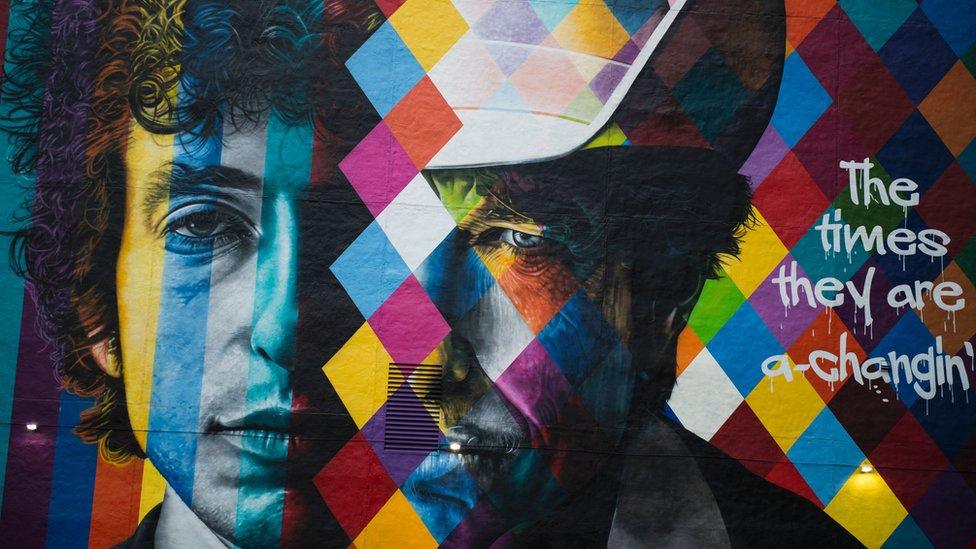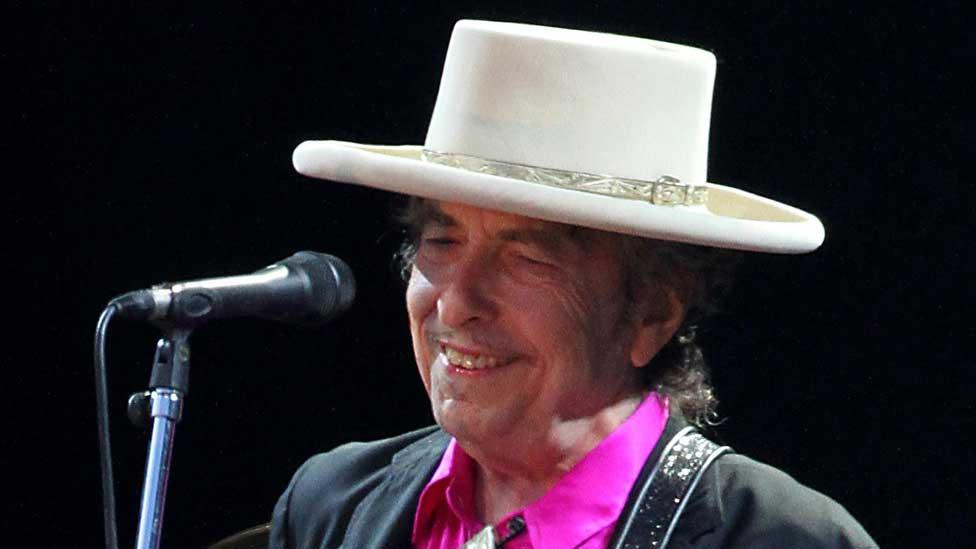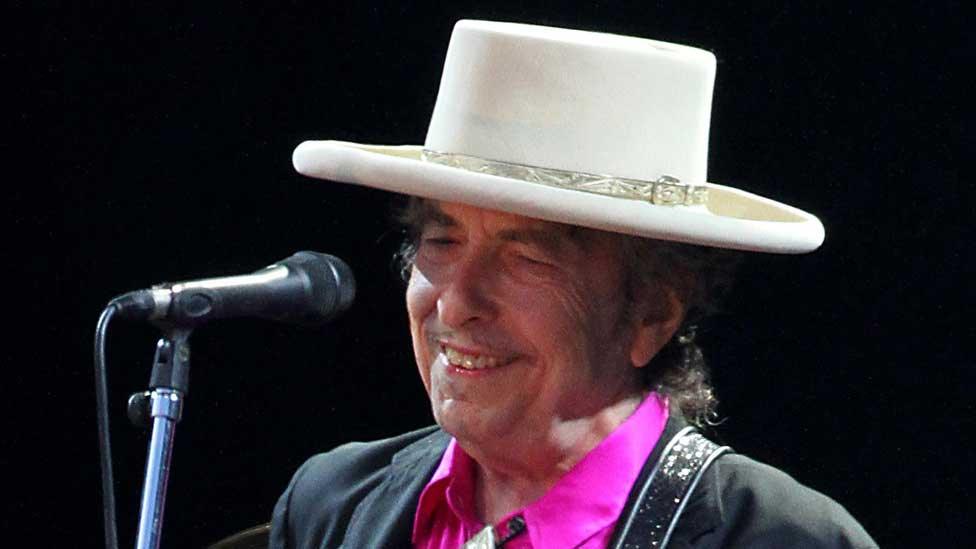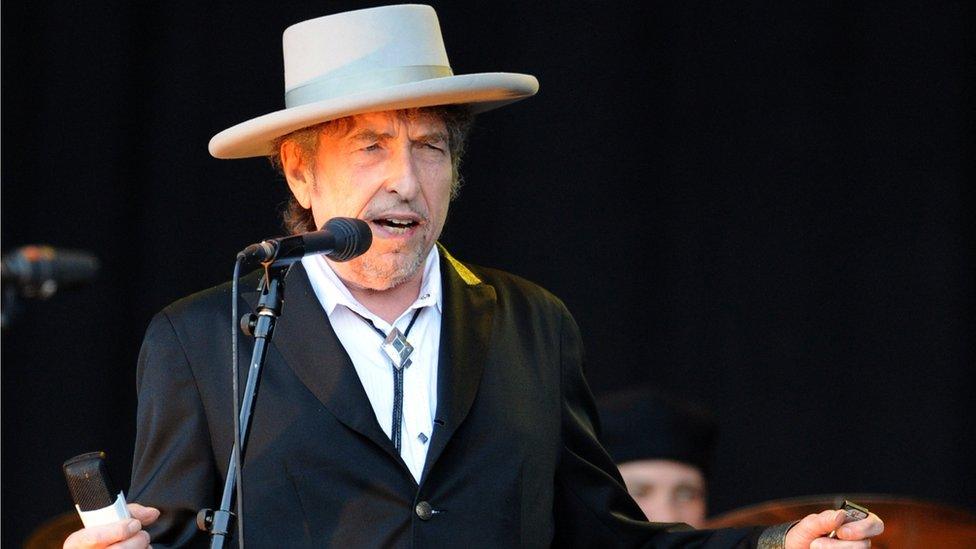Bob Dylan finally delivers his Nobel lecture
- Published
Dylan explains secret to songwriting
Bob Dylan has finally delivered the lecture he needed to give in order to keep the prize money for his Nobel Prize for literature.
The veteran star won the 8m krona ($900,000, £727,000) prize in October but did not collect the award until the end of March at a private event.
And it has taken him until now to issue his taped lecture, which cites Buddy Holly as an influence.
Dylan had until 10 June to deliver the lecture or forfeit the prize money.
The singer mentioned three influential books - Herman Melville's Moby Dick, Homer's The Odyssey and Erich Maria Remarque's All Quiet on the Western Front - in his lecture.
It has been posted on the Nobel website., external
"The speech is extraordinary and, as one might expect, eloquent. Now that the lecture has been delivered, the Dylan adventure is coming to a close," Sara Danius, the permanent secretary of the Swedish Academy, which awards the prize, wrote in a blog post.
Holly 'transmitted something'
Dylan said: "If I was to go back to the dawning of it all, I guess I'd have to start with Buddy Holly... He was the archetype. Everything I wasn't and wanted to be."
Dylan said he "had to travel a hundred miles to get to see him play" and "wasn't disappointed".
Describing the encounter, he said Holly "was powerful and electrifying and had a commanding presence".
"Out of the blue, the most uncanny thing happened. He looked me right straight dead in the eye, and he transmitted something. Something I didn't know what. And it gave me the chills.
"It was a day or two after that that his plane went down… somebody handed me a Lead Belly record with the song Cottonfields on it. And that record changed my life right then and there."

A mural of Dylan appeared in Minnesota, his home state, last October
This led him on to other artists, including Sonny Terry and Brownie McGhee, the New Lost City Ramblers and Jean Ritchie.
"By listening to all the early folk artists and singing the songs yourself, you pick up the vernacular. You internalise it."
He then went on to talk about his literary influences.
'Our songs are alive'
"Specific books that have stuck with me ever since I read them way back in grammar school - I want to tell you about three of them: Moby Dick, All Quiet on the Western Front and The Odyssey."
He described Moby Dick as "a fascinating book, a book that's filled with scenes of high drama and dramatic dialogue".
"All Quiet on the Western Front is a horror story. This is a book where you lose your childhood, your faith in a meaningful world, and your concern for individuals.
"The Odyssey is a great book whose themes have worked its way into the ballads of a lot of songwriters: Homeward Bound, Green, Green Grass of Home, Home on the Range, and my songs as well," he said.
Never-before-seen photos of a young Bob Dylan
Dylan also spoke about the meaning in songs.
"If a song moves you, that's all that's important. I don't have to know what a song means. I've written all kinds of things into my songs. And I'm not going to worry about it - what it all means. "
He concluded: "Our songs are alive in the land of the living. But songs are unlike literature. They're meant to be sung, not read. The words in Shakespeare's plays were meant to be acted on the stage. Just as lyrics in songs are meant to be sung, not read on a page.
"And I hope some of you get the chance to listen to these lyrics the way they were intended to be heard: in concert or on record or however people are listening to songs these days. I return once again to Homer, who says, 'Sing in me, oh Muse, and through me tell the story.'"

Follow us on Facebook, external, on Twitter @BBCNewsEnts, external, or on Instagram at bbcnewsents, external. If you have a story suggestion email entertainment.news@bbc.co.uk, external.
- Published11 December 2016

- Published16 November 2016

- Published1 April 2017
